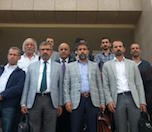The first hearing took place on 17 October 2003. Lawyers Sezgin Tanrikulu, Sabahattin Korkmaz, Burhan Deyar and Habibe Deya are indicted, on the grounds of article 240 of the Turkish Penal Code and Article 59/1-2 of the Law on Legal Profession, for "misconducting duty" and "abusing their legal responsibility" in connection with compensation cases of 96 villagers from Çaglayan village of Kulp district (Diyarbakir), Ziyaret and Uluocak villages of Lice district evacuated and burned in the years 1993 and 1994.
The indictment dated 3 June 2003 argued "defendant lawyers were trying to acquire unjust gains by convincing some people that they were going to get house and money from the state although their villages were not evacuated or burned".
However, "the fact that those villages had been evacuated was also established with a report by the Provincial Directorate of Public Works" Sezgin Tanrikulu said in his testimony.
According to the same report "the houses of 28 families in Derecik field had been fired with all the properties inside, thus tents and blankets had had to be sent to these villages".
After the lawyers had seized the governorship for 96 villagers, the Governorate warned Province Gendarmerie Commandership to make an investigation on the issue whose stated that the claims had been unfounded and filed an official complaint against the four lawyers.
On 3 July, court case was launched against the lawyers. "The trial against Diyarbakir's Bar lawyers is a legal scandal while the real motive behind the prosecution is to prevent them from denouncing the forced evictions and house demolitions resulting in massive forced displacement, carried out between 1989 - 1999 as a form of punishment against the Kurdish population living in the Southern and South Eastern part of Turkey" the two organizations said.
House demolitions and forced evictions in the region were often accompanied by other human rights violations, including brutality, humiliations, threats, enforced disappearances, extra-judicial executions and torture. Overall, no actions have been taken by the Turkish authorities in order to guarantee an independent investigation into the circumstances of these events, identify those responsible, bring them before a competent and impartial tribunal and apply the penal, civil and/or administrative sanctions provided by law.
Most of the victims of house demolitions and forced evictions did not receive redress and compensation.
Moreover, an important number of the victims were often forced to fill-in a formatted petition confirming that they abandoned their rights to redress and compensation. Victims are also often afraid that the seeking of legal action might well prevent their return to their homeland.
The Observatory for the Protection of Human Rights Defenders is very preoccupied by this judicial proceeding against lawyers, which is a flagrant violation of article 9.3.c of the UN Declaration on Human Rights Defenders, which states that: "Everyone has the right, individually and in association with others, to offer and provide professionally qualified legal assistance or other relevant advice and assistance in defending human rights and fundamental freedoms".
In light of these developments before the Diyarbakir Heavy Penal Court on Friday, the Observatory urges the Turkish authorities:
1. to drop the charges against Mr Sezgin Tanrikulu, Sabahattin Korkmaz, Burhan Deyar and Habibe Deyar
2. to conform with United Nations Basic Principles on the Role of Lawyers, adopted by the U.N. General Assembly in 1990 establishing that Governments have the duty to ensure that lawyers can full fill their functions without fear of harassment or improper interference. (The Principle 16 states that Governments shall ensure that lawyers
(a) are able to perform all of their professional functions without intimidation, hindrance, harassment or improper interference; and
(b) (c) shall not suffer, or be threatened with, prosecution or administrative, economic or other sanctions for any action taken in accordance with recognized professional duties, standards and ethics); and to put an end to any kind of harassment and intimidation against the defendants and allow them to carry out their professional duties as lawyers without any fear or hindrance.
3. to form an independent commission to compensate the victims of forced evictions, house demolitions and related injuries and violations;
4. to lift village guard system as their practices are posing a psychological obstacle against return;
5. to permit the victims to return back their homelands and that during the return of the victims the ownership has to be granted based on the extract from the land register;
6. to conform with the provisions of the Declaration on Human Rights Defenders, adopted by the United Nations General assembly on December 9, 1998, as well as the international and regional human rights instruments ratified by Turkey. (NM)
* FIDH: 00 33 1 43 55 25 18 - OMCT: 00 41 22 809 49 24




